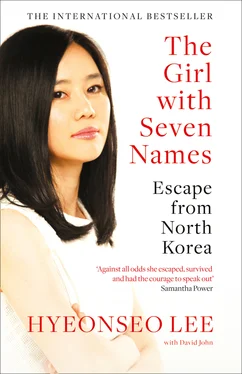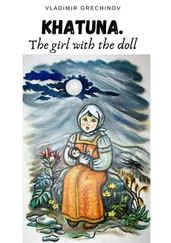Twice I feel tears coming. I pause for an instant, and blink them back.
Among those of us who were born in North Korea and who have escaped it, the story I am telling is not an uncommon one. But I can feel the impact it is having on the people in the audience at this conference. They are shocked. They are probably asking themselves why a country such as mine still exists in the world.
Perhaps it would be even harder for them to understand that I still love my country and miss it very much. I miss its snowy mountains in winter, the smell of kerosene and burning coal. I miss my childhood there, the safety of my father’s embrace, and sleeping on the heated floor. I should be comfortable with my new life, but I’m still the girl from Hyesan who longs to eat noodles with her family at their favourite restaurant. I miss my bicycle and the view across the river into China.
Leaving North Korea is not like leaving any other country. It is more like leaving another universe. I will never truly be free of its gravity, no matter how far I journey. Even for those who have suffered unimaginably there and have escaped hell, life in the free world can be so challenging that many struggle to come to terms with it and find happiness. A small number of them even give up, and return to live in that dark place, as I was tempted to do, many times.
My reality, however, is that I cannot go back. I may dream about freedom in North Korea, but nearly seventy years after its creation, it remains as closed and as cruel as ever. By the time it might ever be safe for me to return, I will probably be a stranger in my own land.
As I read back through this book, I see that it is a story of my awakening, a long and difficult coming of age. I have come to accept that as a North Korean defector I am an outsider in the world. An exile. Try as I may to fit into South Korean society, I do not feel that I will ever fully be accepted as a South Korean. More important, I don’t think I myself will fully accept this as my identity. I went there too late, aged twenty-eight. The simple solution to my problem of identity is to say I am Korean, but there is no such nation. The single Korea does not exist.
I would like to shed my North Korean identity, erase the mark it has made on me. But I can’t. I’m not sure why this is so, but I suspect it is because I had a happy childhood. As children we have a need, as our awareness of the larger world develops, to feel part of something bigger than family, to belong to a nation. The next step is to identify with humanity, as a global citizen. But in me this development got stuck. I grew up knowing almost nothing of the outside world except as it was perceived through the lens of the regime. And when I left, I discovered only gradually that my country is a byword, everywhere, for evil. But I did not know this years ago, when my identity was forming. I thought life in North Korea was normal. Its customs and rulers became strange only with time and distance.
Thus I must say that North Korea is my country. I love it. But I want it to become good. My country is my family and the many good people I knew there. So how could I not be a patriot?
This is my story. I hope that it will allow a glimpse of the world I escaped. I hope it will encourage others like myself, who are struggling to cope with new lives their imaginations never prepared them for. I hope that the world will begin, finally, to listen to them, and to act.
I was awoken by my mother’s cry. Min-ho, my kid brother, was still asleep on the floor next to me. The next thing I knew our father came crashing into the room, yelling ‘Wake up!’ He yanked us up by our arms and herded us, pushed us, out of the room. My mother was behind him, shrieking. It was evening and almost dark. The sky was clear. Min-ho was dazed from sleep. Outside on the street we turned and saw oily black smoke pouring from our kitchen window and dark flames licking the outside wall.
To my astonishment, my father was running back into the house.
A strange roar, a wind rushing inward, swept past us. We heard a whumpf. The tiles on one side of the roof collapsed, and a fireball like a bright orange chrysanthemum rose into the sky, illuminating the street. One side of the house was ablaze. Thick, tar-black smoke was belching from the other windows.
Where was my father?
Our neighbours were suddenly all around us. Someone was throwing a bucket of water – as if that would quench this blaze. We heard the groan and splitting of wood and then the rest of the roof went up in flames.
I wasn’t crying. I wasn’t even breathing. My father wasn’t coming out of the house.
It must only have been seconds but it seemed like minutes. He emerged, running toward us, coughing his lungs up. He was blackened by smoke, his face glistening. Under each arm he was holding two flat, rectangular objects.
He wasn’t thinking of our possessions, or our savings. He’d rescued the portraits. I was thirteen, old enough to understand what was at stake.
Later my mother explained what had happened. Some soldiers had given my father a large can of aviation fuel as a bribe. The can was in the kitchen, which was where we had an iron stove that burned yontan – the circular charcoal cakes used for heating everywhere in North Korea. She was in the act of decanting the fuel into another container when it slipped from her hands and splashed onto the coals. The combustion was explosive. The neighbours must have wondered what on earth she’d been cooking.
A wall of intense heat was advancing from the blaze. Min-ho began to wail. I was holding our mother’s hand. My father put the portraits down with great care, then hugged the three of us – a public display of affection that was rare between my parents.
Huddled together, watching the remains of our home collapse in a rippling glow, the neighbours might have felt sorry for us. My father looked a sight – his face was filthy and his new civilian suit ruined. And my mother, who was house-proud and always made an effort to dress nicely, was seeing her best bowls and clothes go up in smoke.
Yet what struck me most was that neither of my parents seemed that upset. Our home was just a low, two-room house with state-issue furniture, common in North Korea. It’s hard to imagine now how anyone would have missed it. But my parents’ reaction made a strong impression on me. The four of us were together and safe – that was all that mattered to them.
This is when I understood that we can do without almost anything – our home, even our country. But we will never do without other people, and we will never do without family.
The whole street had seen my father save the portraits, an act of heroism that would win a citizen an official commendation. As it turned out, matters had gone too far for that. We did not know it, but he was already under surveillance.
PART ONE
Chapter 1
A train through the mountains
One morning in the late summer of 1977, a young woman said goodbye to her sisters on the platform of Hyesan Station and boarded the train for Pyongyang. She had received official permission to visit her brother there. She was so excited she’d slept little the night before. The Capital of the Revolution was, to her mind, a mythic and futuristic place. A trip there was a rare treat.
The air was still cool and smelled of fresh lumber from the nearby mill; the humidity was not yet too high. Her ticket was for a window seat. The train set off, creaking slowly southward along the old Hyesan Line through steep pine-clad mountains and over shaded gorges. Now and then a white-water river could be glimpsed far below. But as the journey progressed she found herself being distracted from the scenery.
Читать дальше












